The Curse of Conservation: Empirical Evidence Demonstrating That Changes in Land-Use Legislation Drove Catastrophic Bushfires in Southeast Australia
Abstract
1. Introduction
“Country is multi-dimensional—it consists of people, animals, plants, Dreamings; underground, earth, soils, minerals and waters, air…People talk about country in the same way that they would talk about a person: they speak to country, sing to country, visit country, worry about country, feel sorry for country, and long for country.” [38].
1.1. Study Region
1.2. A confluence of Factors
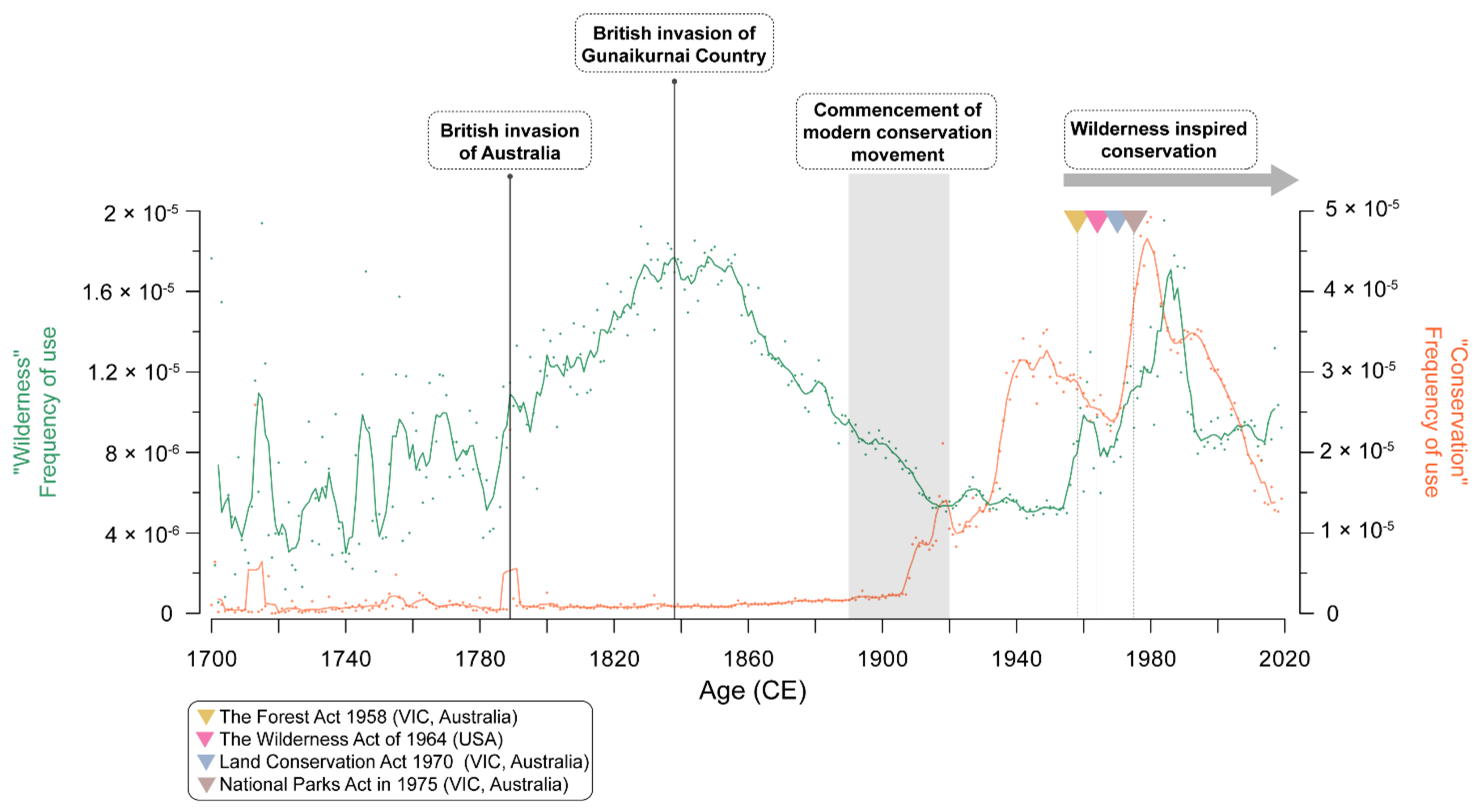
“In our area it was 35 years ago when the use of the burnt areas for cattle grazing was stopped… That happened in about 1970, and in fact it was when the Land Conservation Council first started that it stopped cattle grazing and took the runs off us in our area. That is when the demise of all this started happening. The older ones who are still around will still tell you that one day they will burn us out, because there is no management in the bush anymore as far as fire suppression goes, and, really, it is coming true.” [87]
2. Materials and Methods
2.1. Core Collection & Chronology
2.2. Pollen
2.3. Macroscopic Charcoal & Charanalysis
2.4. Magnetic Susceptibility
2.5. Numerical Data Analysis
Generalised Additive Models (GAMs)
3. Results
3.1. Chronology
3.2. Pollen
3.3. Macroscopic Charcoal & Charanalysis
3.4. Magnetic Susceptibility
3.5. Numerical Data Analysis
Generalised Additive Models
4. Discussion
4.1. Landscape Change between ca. 1900–2021
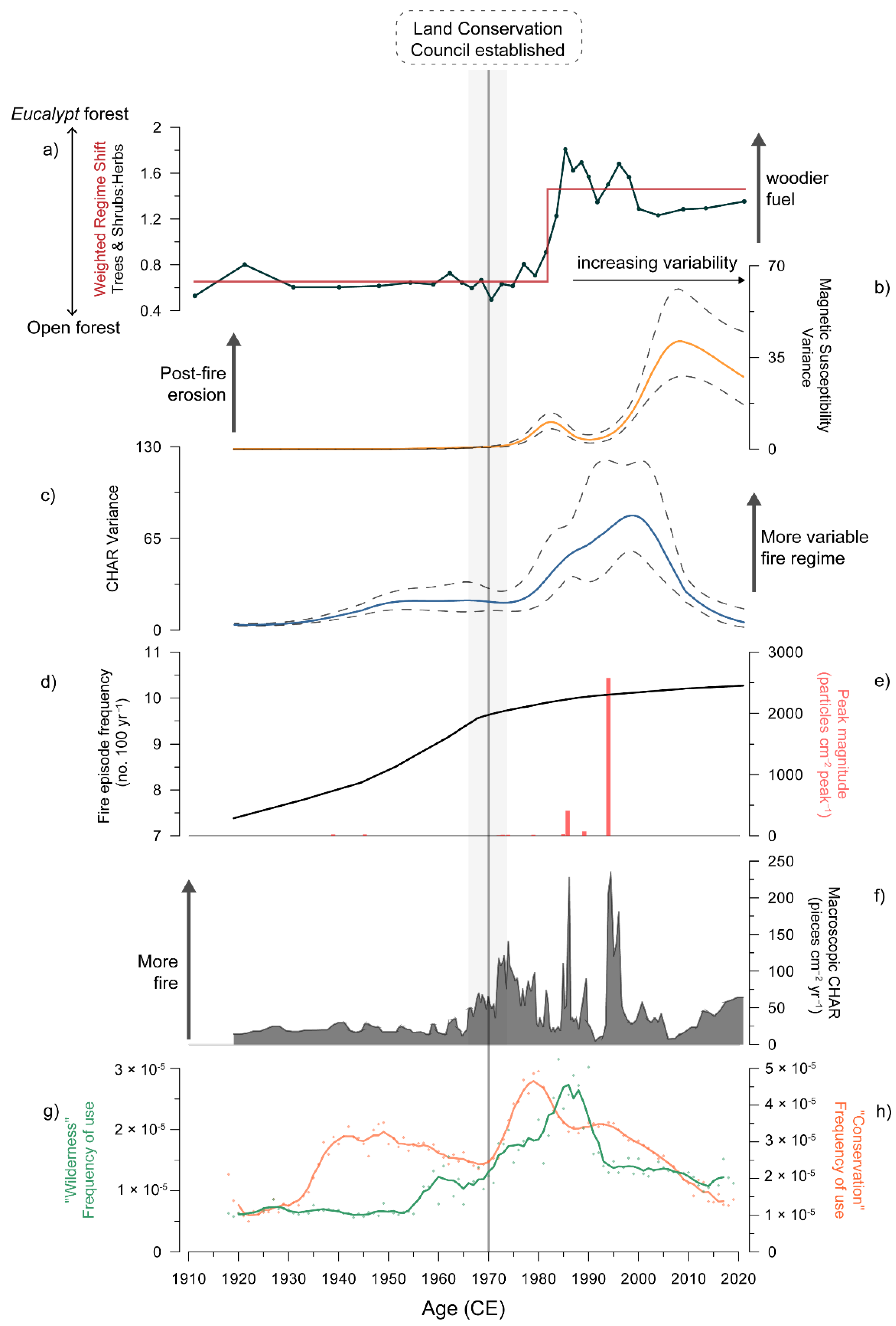
4.2. The Environmental Impact of Legislation
“In earliest times the indigenous people used the firestick as a management tool—burning the dry grass, keeping the grassy areas fresh and green and ensuring a plentiful supply of wildlife. These fires were not dangerous—just slow burning and maintaining a balance in the bush. After the limitations on these people, the settlers followed their ways and the country retained its grassland quality. Forestry Officers took over this responsibility of maintaining a balanced public land service. These men had a good understanding of the bush and did a very good management job. Then the regulations began to be more and more restrictive. Public land management and the responsibility of the Minister, have been evaded, over a long time.” [87].
4.3. The Curse of Conservation That Ignores People as Managers and History as a Prelude
Author Contributions
Funding
Data Availability Statement
Acknowledgments
Conflicts of Interest
References
- Steffen, W.; Broadgate, W.; Deutsch, L.; Gaffney, O.; Ludwig, C. The trajectory of the Anthropocene: The great acceleration. Anthr. Rev. 2015, 2, 81–98. [Google Scholar] [CrossRef]
- Steffen, W.; Rockström, J.; Richardson, K.; Lenton, T.M.; Folke, C.; Liverman, D.; Summerhayes, C.P.; Barnosky, A.D.; Cornell, S.E.; Crucifix, M. Trajectories of the Earth System in the Anthropocene. Proc. Natl. Acad. Sci. USA 2018, 115, 8252–8259. [Google Scholar] [CrossRef] [PubMed]
- Zalasiewicz, J.; Waters, C.N.; Summerhayes, C.P.; Wolfe, A.P.; Barnosky, A.D.; Cearreta, A.; Crutzen, P.; Ellis, E.; Fairchild, I.J.; Gałuszka, A. The Working Group on the Anthropocene: Summary of evidence and interim recommendations. Anthropocene 2017, 19, 55–60. [Google Scholar] [CrossRef]
- Crutzen, P.J. Geology of mankind. In Paul J. Crutzen: A Pioneer on Atmospheric Chemistry and Climate Change in the Anthropocene; Crutzen, P.J., Brauch, H.G., Eds.; Springer: Berlin/Heidelberg, Germany, 2016; pp. 211–215. [Google Scholar]
- Crutzen, P.J. The “anthropocene”. In Earth System Science in the Anthropocene; Ehlers, E., Krafft, T., Eds.; Springer: Berlin/Heidelberg, Germany, 2006; pp. 13–18. [Google Scholar]
- Domínguez, L.; Luoma, C. Decolonising conservation policy: How colonial land and conservation ideologies persist and perpetuate indigenous injustices at the expense of the environment. Land 2020, 9, 65. [Google Scholar] [CrossRef]
- Fox, S.R. The American Conservation Movement: John Muir and His Legacy; University of Wisconsin Press: Madison, WI, USA, 1985. [Google Scholar]
- Taylor, D.E. The Rise of the American Conservation Movement: Power, Privilege, and Environmental Protection; Duke University Press: Durham, NC, USA, 2016. [Google Scholar]
- Watson, J.E.; Evans, T.; Venter, O.; Williams, B.; Tulloch, A.; Stewart, C.; Thompson, I.; Ray, J.C.; Murray, K.; Salazar, A. The exceptional value of intact forest ecosystems. Nat. Ecol. Evol. 2018, 2, 599–610. [Google Scholar] [CrossRef] [PubMed]
- Poirier, R.; Ostergren, D. Evicting people from nature: Indigenous land rights and national parks in Australia, Russia, and the United States. Nat. Resour. J. 2002, 42, 331. [Google Scholar]
- Kammer, S. Coming to terms with wilderness: The Wilderness Act and the problem of wildlife restoration. Environ. Law 2013, 43, 83–124. [Google Scholar]
- Phelps, C.W. Finding Middle Ground on Wilderness: From the Wilderness Act of 1964 to the Forest Jobs and Recreation Act of 2013. Pub. Land Resour. Law Rev. 2015, 36, 223. [Google Scholar]
- Nash, R.F. Wilderness and the American Mind; Yale University Press: New Haven, CT, USA, 2014. [Google Scholar]
- Langton, M. What do we mean by wilderness?: Wilderness and terra nullius in Australian art [Address to The Sydney Institute on 12 October 1995.]. Syd. Pap. 1996, 8, 10–31. [Google Scholar]
- Cronon, W. The trouble with wilderness: Or, getting back to the wrong nature. Environ. Hist. 1996, 1, 7–28. [Google Scholar] [CrossRef]
- Fletcher, M.-S.; Hamilton, R.; Dressler, W.; Palmer, L. Indigenous knowledge and the shackles of wilderness. Proc. Natl. Acad. Sci. USA 2021, 118, e2022218118. [Google Scholar] [CrossRef] [PubMed]
- Ellis, E.C.; Gauthier, N.; Klein Goldewijk, K.; Bliege Bird, R.; Boivin, N.; Díaz, S.; Fuller, D.Q.; Gill, J.L.; Kaplan, J.O.; Kingston, N. People have shaped most of terrestrial nature for at least 12,000 years. Proc. Natl. Acad. Sci. USA 2021, 118, e2023483118. [Google Scholar] [CrossRef] [PubMed]
- Allan, J.R.; Possingham, H.P.; Atkinson, S.C.; Waldron, A.; Di Marco, M.; Butchart, S.H.; Adams, V.M.; Kissling, W.D.; Worsdell, T.; Sandbrook, C. The minimum land area requiring conservation attention to safeguard biodiversity. Science 2022, 376, 1094–1101. [Google Scholar] [CrossRef] [PubMed]
- Clarkson, C.; Jacobs, Z.; Marwick, B.; Fullagar, R.; Wallis, L.; Smith, M.; Roberts, R.G.; Hayes, E.; Lowe, K.; Carah, X. Human occupation of northern Australia by 65,000 years ago. Nature 2017, 547, 306–310. [Google Scholar] [CrossRef]
- Booth, C.; Traill, B. Conservation of Australia’s Outback Wilderness; The Pew Environment Group: Washington, DC, USA, 2008. [Google Scholar]
- Australian Government. Ownership of Protected Areas. Available online: https://www.awe.gov.au/agriculture-land/land/nrs/about-nrs/ownership#levels (accessed on 6 February 2022).
- Woinarski, J.C.; Braby, M.; Burbidge, A.A.; Coates, D.; Garnett, S.T.; Fensham, R.J.; Legge, S.; McKenzie, N.L.; Silcock, J.; Murphy, B.P. Reading the black book: The number, timing, distribution and causes of listed extinctions in Australia. Biol. Conserv. 2019, 239, 108261. [Google Scholar] [CrossRef]
- Bradshaw, C.J. Little left to lose: Deforestation and forest degradation in Australia since European colonization. J. Plant Ecol. 2012, 5, 109–120. [Google Scholar] [CrossRef]
- Waldron, A.; Miller, D.C.; Redding, D.; Mooers, A.; Kuhn, T.S.; Nibbelink, N.; Roberts, J.T.; Tobias, J.A.; Gittleman, J.L. Reductions in global biodiversity loss predicted from conservation spending. Nature 2017, 551, 364–367. [Google Scholar] [CrossRef]
- Boer, M.M.; de Dios, V.R.; Bradstock, R.A. Unprecedented burn area of Australian mega forest fires. Nat. Clim. Chang. 2020, 10, 171–172. [Google Scholar] [CrossRef]
- Bradstock, R.A.; Hammill, K.A.; Collins, L.; Price, O. Effects of weather, fuel and terrain on fire severity in topographically diverse landscapes of south-eastern Australia. Landsc. Ecol. 2010, 25, 607–619. [Google Scholar] [CrossRef]
- Bowman, D.M.; Balch, J.; Artaxo, P.; Bond, W.J.; Cochrane, M.A.; D’antonio, C.M.; DeFries, R.; Johnston, F.H.; Keeley, J.E.; Krawchuk, M.A. The human dimension of fire regimes on Earth. J. Biogeogr. 2011, 38, 2223–2236. [Google Scholar] [CrossRef]
- Olson, D.M.; Dinerstein, E. The Global 200: Priority ecoregions for global conservation. Ann. Mo. Bot. Gard. 2002, 89, 199–224. [Google Scholar] [CrossRef]
- Watson, J.E.; Venter, O.; Lee, J.; Jones, K.R.; Robinson, J.G.; Possingham, H.P.; Allan, J.R. Protect the last of the wild. Nature 2018, 563, 27–30. [Google Scholar] [CrossRef] [PubMed]
- Montoya, E.; Lombardo, U.; Levis, C.; Aymard, G.A.; Mayle, F.E. Human contribution to Amazonian plant diversity: Legacy of pre-Columbian land use in modern plant communities. In Neotropical Diversification: Patterns and Processes; Rull, V., Carnaval, A.C., Eds.; Springer: Berlin/Heidelberg, Germany, 2020; pp. 495–520. [Google Scholar]
- Hamilton, R.; Penny, D.; Hall, T.L. Forest, fire & monsoon: Investigating the long-term threshold dynamics of south-east Asia’s seasonally dry tropical forests. Quat. Sci. Rev. 2020, 238, 106334. [Google Scholar]
- Larson, E.R.; Kipfmueller, K.F.; Johnson, L.B. People, Fire, and Pine: Linking Human Agency and Landscape in the Boundary Waters Canoe Area Wilderness and Beyond. Ann. Am. Assoc. Geogr. 2021, 111, 1–25. [Google Scholar] [CrossRef]
- Neale, T.; Carter, R.; Nelson, T.; Bourke, M. Walking together: A decolonising experiment in bushfire management on Dja Dja Wurrung country. Cult. Geogr. 2019, 26, 341–359. [Google Scholar] [CrossRef]
- Fletcher, M.-S.; Romano, A.; Connor, S.; Mariani, M.; Maezumi, S.Y. Catastrophic bushfires, indigenous fire knowledge and reframing science in Southeast Australia. Fire 2021, 4, 61. [Google Scholar] [CrossRef]
- McKemey, M.B.; Patterson, M.L.; Rangers, B.; Ens, E.J.; Reid, N.C.; Hunter, J.T.; Costello, O.; Ridges, M.; Miller, C. Cross-cultural monitoring of a cultural keystone species informs revival of indigenous burning of country in South-Eastern Australia. Hum. Ecol. 2019, 47, 893–904. [Google Scholar] [CrossRef]
- Weir, J.K.; Sutton, S.; Catt, G. The theory/practice of disaster justice: Learning from indigenous peoples’ fire management. In Natural Hazards and Disaster Justice; Springer: Berlin/Heidelberg, Germany, 2020; pp. 299–317. [Google Scholar]
- Stoeckl, N.; Jarvis, D.; Larson, S.; Larson, A.; Grainger, D. Australian Indigenous insights into ecosystem services: Beyond services towards connectedness—People, place and time. Ecosyst. Serv. 2021, 50, 101341. [Google Scholar] [CrossRef]
- Rose, D.B.; Commission, A.H. Nourishing Terrains: Australian Aboriginal Views of Landscape and Wilderness; Australian Heritage Commission: Sydney, Australia, 1996. [Google Scholar]
- Forest Fire Management Victoria. The Victorian Traditional Owner Cultural Fire Strategy; The Victorian Traditional Owner Cultural Fire Knowledge Group: Bundoora, Australia, 2019. [Google Scholar]
- Barber, M.; Jackson, S. Identifying and categorizing cobenefits in state-supported Australian indigenous environmental management programs: International research implications. Ecol. Soc. 2017, 22, 11. [Google Scholar] [CrossRef]
- Mariani, M.; Connor, S.E.; Theuerkauf, M.; Herbert, A.; Kuneš, P.; Bowman, D.; Fletcher, M.S.; Head, L.; Kershaw, A.P.; Haberle, S.G. Disruption of cultural burning promotes shrub encroachment and unprecedented wildfires. Front. Ecol. Environ. 2021, 20, 292–300. [Google Scholar] [CrossRef]
- Gill, A.M.; Catling, P.C. landscapes of southern Australia. In Flammable Australia: The Fire Regimes and Biodiversity of a Continent; Bradstock, R.A., Williams, J.E., Gill, A.M., Eds.; Cambridge University Press: Cambridge, UK, 2002; pp. 351–369. [Google Scholar]
- Trauernicht, C.; Brook, B.W.; Murphy, B.P.; Williamson, G.J.; Bowman, D.M. Local and global pyrogeographic evidence that indigenous fire management creates pyrodiversity. Ecol. Evol. 2015, 5, 1908–1918. [Google Scholar] [CrossRef] [PubMed]
- Fletcher, M.-S.; Hall, T.; Alexandra, A.N. The loss of an indigenous constructed landscape following British Invasion of Australia: An insight into the deep human imprint on the Australian landscape. Ambio 2021, 50, 138–149. [Google Scholar] [CrossRef] [PubMed]
- Steffensen, V. Fire Country: How Indigenous Fire Management Could Help Save Australia; CSIRO Publishing: Melbourne, Australia, 2020. [Google Scholar]
- Yibarbuk, D.; Whitehead, P.J.; Russell-Smith, J.; Jackson, D.; Godjuwa, C.; Fisher, A.; Cooke, P.; Choquenot, D.; Bowman, D.M. Fire ecology and Aboriginal land management in central Arnhem Land, northern Australia: A tradition of ecosystem management. J. Biogeogr. 2001, 28, 325–343. [Google Scholar] [CrossRef]
- Environment and Natural Resources Committee. Inquiry into the Impact of Public Land Management Practices on Bushfires in Victoria; Victorian Government: Melbourne, Australia, 2008. [Google Scholar]
- Gammage, B. The Biggest Estate on Earth: How Aborigines Made Australia, 1st ed.; Allen, E., Ed.; Unwin: Crow’s Nest, Australia, 2011. [Google Scholar]
- Pascoe, B. Dark Emu: Aboriginal Australia and the Birth of Agriculture; Magabala Books: Broome, Australia, 2018. [Google Scholar]
- Gunaikurnai Land and Waters Aboriginal Corporation. Gunaikurnai Whole-of-Country Plan; Gunaikurnai Land and Waters Aboriginal Corporation: Bairnsdale, Australia, 2015. [Google Scholar]
- Parks Victoria. Snowy River National Park. Available online: https://www.parks.vic.gov.au/places-to-see/parks/-/media/26b477b5cba3455a9e24ea18525a54c4.ashx (accessed on 15 May 2022).
- Levin, N.; Yebra, M.; Phinn, S. Unveiling the factors responsible for Australia’s Black Summer fires of 2019/2020. Fire 2021, 4, 58. [Google Scholar] [CrossRef]
- David, B.; Fresløv, J.; Mullett, R.; Land, G.; Corporation, W.A.; Delannoy, J.-J.; McDowell, M.; Urwin, C.; Mialanes, J.; Petchey, F.; et al. 50 years and worlds apart: Rethinking the Holocene occupation of Cloggs Cave (East Gippsland, SE Australia) five decades after its initial archaeological excavation and in light of GunaiKurnai world views. Aust. Archaeol. 2020, 87, 1–20. [Google Scholar] [CrossRef]
- Department of Environment, Land, Water & Planning. Fire Severity Map of the Major Fires in Gippsland and North East VICTORIA in 2019/20 (Version 1.0); Victorian Government: Melbourne, Australia, 2021. Available online: https://discover.data.vic.gov.au/dataset/fire-severity-map-of-the-major-fires-in-gippsland-and-north-east-victoria-in-2019-20-version-1 (accessed on 15 May 2022).
- New South Whales Government. Joint Select Committee on Bushfires: Report on the Inquiry into the 2001/2002 Bushfires; New South Whales Government: Sydney, Australia, 2002. [Google Scholar]
- Parliament of Victoria. Fire Management: Effectiveness of Broadscale Fuel Reduction Burning in Assisting with Wildfire Control in Parks and Forests in Victoria; Victorian Government: Melbourne, Australia, 2001. [Google Scholar]
- McCormick, B.M. Daniel Bushfires and Fuel Reduction Burning; Parlament of Australia: Canberra, Australia, 2021. [Google Scholar]
- Australian Bureau of Agricultural and Resource Economics and Sciences. Forests of Australia; Australian Government: Canberra, Australia, 2018. Available online: https://portal.ga.gov.au/metadata/agriculture/forests/tenure-of-australias-forests-abares/b73de0bb-005d-41d1-babd-7e59f81c5de2 (accessed on 15 May 2022).
- Department of Agriculture, Water and the Environment. The National Indicative Aggregated Fire Extent Dataset; Australian Government: Canberra, Australia, 2020. Available online: https://www.environment.gov.au/fed/catalog/search/resource/details.page?uuid=%7B9ACDCB09-0364-4FE8-9459-2A56C792C743%7D (accessed on 15 May 2022).
- Nearmap. Map of Buchan, Victoria. 2021. Available online: https://www.nearmap.com/au/en (accessed on 15 May 2022).
- Von Guérard, E. Junction of the Buchan and Snowy Rivers, Gippsland. 1867. Available online: https://catalogue.nla.gov.au/Record/2105804 (accessed on 9 May 2022).
- Fletcher, M.-S.; Cadd, H.R.; Mariani, M.; Hall, T.L.; Wood, S.W. The role of species composition in the emergence of alternate vegetation states in a temperate rainforest system. Landsc. Ecol. 2020, 35, 2275–2285. [Google Scholar] [CrossRef]
- Sullivan, A.L.; McCaw, W.L.; Cruz, M.G.; Matthews, S.; Ellis, P.F. Fuel, fire weather and fire behaviour in Australian ecosystems. In Flammable Australia: Fire Regimes, Biodiversity and Ecosystems in a Changing World; Bradstock, R.A., Gill, A.M., Williams, R.J., Eds.; CSIRO Publishing: Collingwood, Australia, 2012; pp. 51–77. [Google Scholar]
- Dixon, K.M.; Cary, G.J.; Worboys, G.L.; Seddon, J.; Gibbons, P. A comparison of fuel hazard in recently burned and long-unburned forests and woodlands. Int. J. Wildland Fire 2018, 27, 609–622. [Google Scholar] [CrossRef]
- McArthur, A.G. Fire Behaviour in Eucalypt Forests; Forestry and Timber Bureau: Canberra, Australia, 1967. [Google Scholar]
- Moritz, M.A.; Parisien, M.-A.; Batllori, E.; Krawchuk, M.A.; Van Dorn, J.; Ganz, D.J.; Hayhoe, K. Climate change and disruptions to global fire activity. Ecosphere 2012, 3, 1–22. [Google Scholar] [CrossRef]
- Mariani, M.; Fletcher, M.S.; Holz, A.; Nyman, P. ENSO controls interannual fire activity in southeast Australia. Geophys. Res. Lett. 2016, 43, 10891–10900. [Google Scholar] [CrossRef]
- Boyce, J. 1835: The Founding of Melbourne and the Conquest of Australia; Black Inc. Publishing: Melbourne, Australia, 2011. [Google Scholar]
- Johnson, C.N.; Balmford, A.; Brook, B.W.; Buettel, J.C.; Galetti, M.; Guangchun, L.; Wilmshurst, J.M. Biodiversity losses and conservation responses in the Anthropocene. Science 2017, 356, 270–275. [Google Scholar] [CrossRef]
- Lyver, P.O.B.; Tylianakis, J.M. Indigenous peoples: Conservation paradox. Science 2017, 357, 142–143. [Google Scholar] [CrossRef] [PubMed]
- Adams, W.B.; Mulligan, M. Introduction. In Decolonizing Nature: Strategies for Conservation in a Post-Colonial Era; William Adams, M.M., Ed.; Earthscan Publications ltd: London, UK, 2012; pp. 1–15. [Google Scholar]
- Clement, V. Beyond the sham of the emancipatory Enlightenment: Rethinking the relationship of Indigenous epistemologies, knowledges, and geography through decolonizing paths. Prog. Hum. Geogr. 2019, 43, 276–294. [Google Scholar] [CrossRef]
- Merchant, C. The scientific revolution and the death of nature. Isis 2006, 97, 513–533. [Google Scholar] [CrossRef]
- Berkes, F. Sacred Ecology; Routledge: London, UK, 2017. [Google Scholar]
- Parliament of Victoria. National Parks Act 1975. Available online: https://www.legislation.vic.gov.au/in-force/acts/national-parks-act-1975/ (accessed on 18 May 2022).
- Parliament of Victoria. Land Conservation Act 1970. Available online: http://www.austlii.edu.au/au/legis/vic/hist_act/lca1970191/ (accessed on 18 May 2022).
- Parliament of Victoria. Forests Acts 1958. Available online: https://www.legislation.vic.gov.au/in-force/acts/forests-act-1958/ (accessed on 18 May 2022).
- Forest Fire Management Victoria. Planned burning in Victoria. Available online: https://www.ffm.vic.gov.au/bushfire-fuel-and-risk-management/planned-burning-in-victoria (accessed on 18 May 2022).
- Deloite Access Economics. Economic Reality Check: Adapting Australia for Climate-Resilient Growth; Deloitte: London, UK, 2022. [Google Scholar]
- Menzies Research Centre Policy Paper. Strengthening Resilience: Managing National Disasters after the 2019–2020 Bushfire Season; Menzies Research Centre: Melbourne, Australia, 2020. [Google Scholar]
- Canadell, J.G.; Meyer, C.P.; Cook, G.D.; Dowdy, A.; Briggs, P.R.; Knauer, J.; Pepler, A.; Haverd, V. Multi-decadal increase of forest burned area in Australia is linked to climate change. Nat. Commun. 2021, 12, 6921. [Google Scholar] [CrossRef]
- Carmody, S.; Carmody, M.S. Package ‘Ngramr’, version 1.9.0; RStudio: Boston, MA, USA, 2022. [Google Scholar]
- O’Mahony, C. Living on a massacre site: Home truths and trauma at Warrigal Creek. The Guardian Australia, 6 March 2019. [Google Scholar]
- Gorrie, R. Telling our painful truth about massacres is the path to healing. The Age, 29 March 2022. [Google Scholar]
- Flynn, C. Thicker Than Water; 4th Estate: London, UK, 2016. [Google Scholar]
- Buchan Sesquicentenary Committee. Bukan-Mungie: 150 Years of Settlement in the Buchan District, 1839–1989; E-Gee Printers: Bairnsdale, Australia, 1989. [Google Scholar]
- Environment and Natural Resources Committee. Inquiry into the Impact of Public Land Management Practices on Bushfires in Victoria Hearing Transcript; Victorian Government: Melbourne, Australia, 2007. [Google Scholar]
- Lawrence, G. Capitalism and the Countryside: The Rural Crisis in Australia; Pluto Press: Sydney, Australia, 1987. [Google Scholar]
- Public Record Office Victoria. VA 1410 Land Conservation Council 1971–1997. Available online: https://prov.vic.gov.au/archive/VA1410 (accessed on 20 May 2022).
- Aquatic Research Instruments. Universal Percussion Corer. Available online: http://www.aquaticresearch.com/universal_core_head.htm (accessed on 18 March 2022).
- Atahan, P.; Heijnis, H.; Dodson, J.; Grice, K.; Le Metayer, P.; Taffs, K.; Hembrow, S.; Woltering, M.; Zawadzki, A. Pollen, biomarker and stable isotope evidence of late Quaternary environmental change at Lake McKenzie, southeast Queensland. J. Paleolimnol. 2015, 53, 139–156. [Google Scholar] [CrossRef]
- Appleby, P.G.; Oldfield, F. The calculation of lead-210 dates assuming a constant rate of supply of unsupported 210Pb to the sediment. Catena 1978, 5, 1–8. [Google Scholar] [CrossRef]
- R Core Development Team. The R Project for Statistical Computing. Available online: https://www.r-project.org/ (accessed on 15 May 2022).
- Blaauw, M. Methods and code for ‘classical’age-modelling of radiocarbon sequences. Quat. Geochronol. 2010, 5, 512–518. [Google Scholar] [CrossRef]
- Faegri, K.; Iversen, J. Textbook of Pollen Analysis, 4th ed.; Faegri, K., Kaland, P.E., Krzywinski, K., Eds.; The Blackburn Press: Caldwell, NJ, USA, 1989. [Google Scholar]
- Grimm, E.C. CONISS: A FORTRAN 77 program for stratigraphically constrained cluster analysis by the method of incremental sum of squares. Comput. Geosci. 1987, 13, 13–35. [Google Scholar] [CrossRef]
- Grimm, E. Tilia Software, Version 2.0. 2. Ill.; Illinois State Museum Research and Collection Center: Springfield, IL, USA, 2004.
- Juggins, S. Package ‘rioja’, version 0.9-26; Analysis of Quaternary Science Data; RStudio: Boston, MA, USA, 2016. [Google Scholar]
- Hill, M.O.; Gauch, H.G. Detrended correspondence analysis: An improved ordination technique. In Classification and Ordination; Springer: Berlin/Heidelberg, Germany, 1980; pp. 47–58. [Google Scholar]
- McCune, B.; Mefford, M.J. PC-ORD. Multivariate Analysis of Ecological Data, Version 6; MjM Software Design: Gleneden Beach, OR, USA, 1999. [Google Scholar]
- Whitlock, C.; Larsen, C. Charcoal as a fire proxy. In Tracking Environmental Change Using Lake Sediments; Smol, J.P., John, H., Birks, B., Last, W.M., Eds.; Springer: Berlin/Heidelberg, Germany, 2001; pp. 75–97. [Google Scholar]
- Mustaphi, C.J.C.; Pisaric, M.F. A classification for macroscopic charcoal morphologies found in Holocene lacustrine sediments. Prog. Phys. Geogr. 2014, 38, 734–754. [Google Scholar] [CrossRef]
- Graves, B.P.; Ralph, T.J.; Hesse, P.P.; Westaway, K.E.; Kobayashi, T.; Gadd, P.S.; Mazumder, D. Macro-charcoal accumulation in floodplain wetlands: Problems and prospects for reconstruction of fire regimes and environmental conditions. PLoS ONE 2019, 14, e0224011. [Google Scholar] [CrossRef]
- Fletcher, M.-S.; Bowman, D.; Whitlock, C.; Mariani, M.; Stahle, L. The changing role of fire in conifer-dominated temperate rainforest through the last 14,000 years. Quat. Sci. Rev. 2018, 182, 37–47. [Google Scholar] [CrossRef]
- Fletcher, M.-S.; Wood, S.W.; Haberle, S.G. A fire-driven shift from forest to non-forest: Evidence for alternative stable states? Ecology 2014, 95, 2504–2513. [Google Scholar] [CrossRef]
- McWethy, D.B.; Whitlock, C.; Wilmshurst, J.M.; McGlone, M.S.; Fromont, M.; Li, X.; Dieffenbacher-Krall, A.; Hobbs, W.O.; Fritz, S.C.; Cook, E.R. Rapid landscape transformation in South Island, New Zealand, following initial Polynesian settlement. Proc. Natl. Acad. Sci. USA 2010, 107, 21343–21348. [Google Scholar] [CrossRef] [PubMed]
- Higuera, P. CharAnalysis 0.9: Diagnostic and Analytical Tools for Sediment-Charcoal Analysis: User’s Guide; Montana State University: Bozeman, MT, USA, 2009. [Google Scholar]
- Higuera, P.E.; Gavin, D.G.; Bartlein, P.J.; Hallett, D.J. Peak detection in sediment–charcoal records: Impacts of alternative data analysis methods on fire-history interpretations. Int. J. Wildland Fire 2010, 19, 996–1014. [Google Scholar] [CrossRef]
- Croudace, I.W.; Rothwell, R.G. Future developments and innovations in high-resolution core scanning. In Micro-XRF Studies of Sediment Cores; Croudace, I.W., Rothwell, R.G., Eds.; Springer: Berlin/Heidelberg, Germany, 2015; pp. 627–647. [Google Scholar]
- Leys, B.; Higuera, P.E.; McLauchlan, K.K.; Dunnette, P.V. Wildfires and geochemical change in a subalpine forest over the past six millennia. Environ. Res. Lett. 2016, 11, 125003. [Google Scholar] [CrossRef]
- Geotek. Core Splitter. Available online: https://www.geotek.co.uk/products/core_splitter/ (accessed on 25 May 2022).
- Limited, B.I. MS2/MS3 System. Available online: https://www.bartington.com/products/magnetic-susceptibility/ms2-ms3-system/ (accessed on 25 May 2022).
- Appleby, P.; Dearing, J.; Oldfield, F. Magnetic studies of erosion in a Scottish lake catchment. 1. Core chronology and correlation 1. Limnol. Oceanogr. 1985, 30, 1144–1153. [Google Scholar] [CrossRef]
- Dearing, J. Change from Magnetic Proxies in Lake Sediments. In Quaternary Climates, Environments and Magnetism; Maher, B.A., Thompson, R., Eds.; Cambridge Univerisy Press: Cambridge, UK, 1999; p. 231. [Google Scholar]
- Reid, M. Evidence for catastrophic shifts in the trophic structure of flood-plain lakes associated with soil erosion. IAHS Publ. 2008, 325, 584. [Google Scholar]
- Fletcher, M.S.; Wolfe, B.B.; Whitlock, C.; Pompeani, D.P.; Heijnis, H.; Haberle, S.G.; Gadd, P.S.; Bowman, D.M. The legacy of mid-Holocene fire on a Tasmanian montane landscape. J. Biogeogr. 2014, 41, 476–488. [Google Scholar] [CrossRef]
- Beck, K.; Fletcher, M.S.; Gadd, P.S.; Heijnis, H.; Saunders, K.M.; Simpson, G.L.; Zawadzki, A. Variance and rate-of-change as early warning signals for a critical transition in an aquatic ecosystem state: A test case from Tasmania, Australia. J. Geophys. Res. Biogeosci. 2018, 123, 495–508. [Google Scholar] [CrossRef]
- Hastie, T.; Tibshirani, R. Exploring the nature of covariate effects in the proportional hazards model. Biometrics 1990, 46, 1005–1016. [Google Scholar] [CrossRef]
- Simpson, G.L.; Anderson, N. Deciphering the effect of climate change and separating the influence of confounding factors in sediment core records using additive models. Limnol. Oceanogr. 2009, 54, 2529–2541. [Google Scholar] [CrossRef]
- Yee, T.W.; Mitchell, N.D. Generalized additive models in plant ecology. J. Veg. Sci. 1991, 2, 587–602. [Google Scholar] [CrossRef]
- Wood, S.; Wood, M.S. Package ‘mgcv’: R Package Version; RStudio: Boston, MA, USA, 2016. [Google Scholar]
- Wood, S.N. Fast stable restricted maximum likelihood and marginal likelihood estimation of semiparametric generalized linear models. J. R. Stat. Soc. Ser. B Stat. Methodol. 2011, 73, 3–36. [Google Scholar] [CrossRef]
- Bunting, L.; Leavitt, P.; Simpson, G.; Wissel, B.; Laird, K.; Cumming, B.; Amand, A.S.; Engstrom, D. Increased variability and sudden ecosystem state change in Lake Winnipeg, Canada, caused by 20th century agriculture. Limnol. Oceanogr. 2016, 61, 2090–2107. [Google Scholar] [CrossRef]
- Arnold, T.W. Uninformative parameters and model selection using Akaike’s Information Criterion. J. Wildl. Manag. 2010, 74, 1175–1178. [Google Scholar] [CrossRef]
- Carpenter, S.R.; Brock, W.A. Rising variance: A leading indicator of ecological transition. Ecol. Lett. 2006, 9, 311–318. [Google Scholar] [CrossRef]
- Brock, W.A.; Carpenter, S.R.; Scheffer, M. Regime shifts, environmental signals, uncertainty, and policy choice. In A Theoretical Framework for Analyzing Social-Ecological Systems; Norberg, J., Cumming, G.S., Eds.; Columbia University Press: New York, NY, USA, 2008; pp. 180–206. [Google Scholar]
- Borcard, D.; Legendre, P.; Drapeau, P. Partialling out the spatial component of ecological variation. Ecology 1992, 73, 1045–1055. [Google Scholar] [CrossRef]
- Hodgson, D.; McDonald, J.L.; Hosken, D.J. What do you mean,‘resilient’? Trends Ecol. Evol. 2015, 30, 503–506. [Google Scholar] [CrossRef]
- Simpson, G.L. Modelling palaeoecological time series using generalised additive models. Front. Ecol. Evol. 2018, 6, 149. [Google Scholar] [CrossRef]
- Wilson, A. Flora of Australia—Volume 37—Asteraceae 1; ABRS/CSIRO Publishing: Melbourne, Australia, 2015. [Google Scholar]
- Gott, B. Murnong-Microseris scapigera: A study of a staple food of Victorian Aborigines. In Australian Aboriginal Studies; Aboriginal Studies Press: Canberra, Australia, 1983; pp. 2–18. [Google Scholar]
- Gott, B. Indigenous use of plants in south-eastern Australia. Telopea 2008, 12, 215–226. [Google Scholar] [CrossRef]
- Clarke, P. Early Aboriginal plant foods in southern South Australia. Proc. Nutr. Soc. Australia 1998, 22, 16–20. [Google Scholar]
- Colombaroli, D.; Gavin, D.G. Highly episodic fire and erosion regime over the past 2000 y in the Siskiyou Mountains, Oregon. Proc. Natl. Acad. Sci. USA 2010, 107, 18909–18914. [Google Scholar] [CrossRef]
- Brown, S.R.; Stone, J.R.; McLennan, D.; Latimer, J.; Westover, K.S. Landscape–lake interactions in the Beartooth Mountains, Wyoming: A 350-year fire history reconstruction. J. Paleolimnol. 2020, 64, 107–119. [Google Scholar] [CrossRef]
- Rodionov, S.N. A sequential algorithm for testing climate regime shifts. Geophys. Res. Lett. 2004, 31. [Google Scholar] [CrossRef]
- Bird, R.B.; Bird, D.W.; Codding, B.F.; Parker, C.H.; Jones, J.H. The “fire stick farming” hypothesis: Australian Aboriginal foraging strategies, biodiversity, and anthropogenic fire mosaics. Proc. Natl. Acad. Sci. USA 2008, 105, 14796–14801. [Google Scholar] [CrossRef]
- Fletcher, M.S.; Thomas, I. The origin and temporal development of an ancient cultural landscape. J. Biogeogr. 2010, 37, 2183–2196. [Google Scholar] [CrossRef]
- Mariani, M.; Connor, S.E.; Fletcher, M.S.; Theuerkauf, M.; Kuneš, P.; Jacobsen, G.; Saunders, K.M.; Zawadzki, A. How old is the Tasmanian cultural landscape? A test of landscape openness using quantitative land-cover reconstructions. J. Biogeogr. 2017, 44, 2410–2420. [Google Scholar] [CrossRef]
- Mulligan, J. East Gippsland Wildfire Taskforce Inc Submission to the Inquiry into Impact on Public Land Management Practices on Bushfire in Victoria. 2007. Available online: https://southeasttimberassociation.com/wp-content/uploads/2019/02/Fire-in-East-Gippsland-by-John-Mulligan.pdf (accessed on 12 April 2022).
- Davey, S.M.; Sarre, A. The 2019/20 Black Summer bushfires. Aust. For. 2020, 83, 47–51. [Google Scholar] [CrossRef]
- Bowman, D.M.; Murphy, B.P.; Boer, M.M.; Bradstock, R.A.; Cary, G.J.; Cochrane, M.A.; Fensham, R.J.; Krawchuk, M.A.; Price, O.F.; Williams, R.J. Forest fire management, climate change, and the risk of catastrophic carbon losses. Front. Ecol. Environ. 2013, 11, 66–68. [Google Scholar] [CrossRef]
- Van Oldenborgh, G.J.; Krikken, F.; Lewis, S.; Leach, N.J.; Lehner, F.; Saunders, K.R.; Van Weele, M.; Haustein, K.; Li, S.; Wallom, D. Attribution of the Australian bushfire risk to anthropogenic climate change. Nat. Hazards Earth Syst. Sci. 2021, 21, 941–960. [Google Scholar] [CrossRef]
- Abram, N.J.; Henley, B.J.; Sen Gupta, A.; Lippmann, T.J.; Clarke, H.; Dowdy, A.J.; Sharples, J.J.; Nolan, R.H.; Zhang, T.; Wooster, M.J. Connections of climate change and variability to large and extreme forest fires in southeast Australia. Commun. Earth Environ. 2021, 2, 8. [Google Scholar] [CrossRef]
- Phillips, N.; Nogrady, B. The race to decipher how climate change influenced Australia’s record fires. Nature 2020, 577, 610–613. [Google Scholar] [CrossRef] [PubMed]
- Hennessy, K.; Lucas, C.; Nicholls, N.; Bathols, J.; Suppiah, R.; Ricketts, J. Climate Change Impacts on Fire-Weather in South-East Australia; CSIRO Marine and Atmospheric Research: Clayton, Australia; Australian Government Bureau of Meteorology: Aspendale, Australia, 2005. [Google Scholar]
- Attiwill, P.M.; Adams, M.A. Mega-fires, inquiries and politics in the eucalypt forests of Victoria, south-eastern Australia. For. Ecol. Manag. 2013, 294, 45–53. [Google Scholar] [CrossRef]
- Stephens, S.L.; Moghaddas, J.J.; Edminster, C.; Fiedler, C.E.; Haase, S.; Harrington, M.; Keeley, J.E.; Knapp, E.E.; McIver, J.D.; Metlen, K. Fire treatment effects on vegetation structure, fuels, and potential fire severity in western US forests. Ecol. Appl. 2009, 19, 305–320. [Google Scholar] [CrossRef] [PubMed]
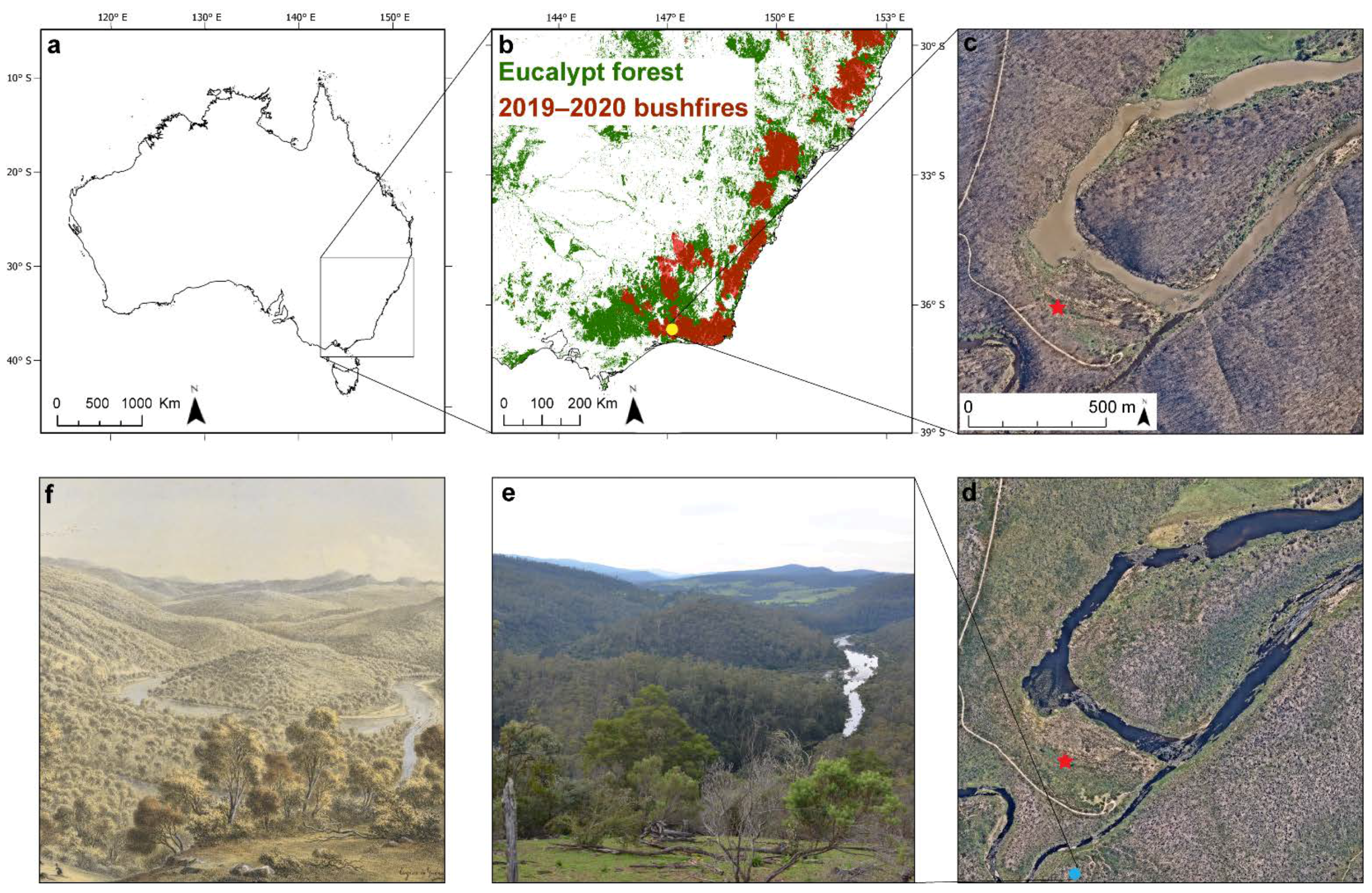
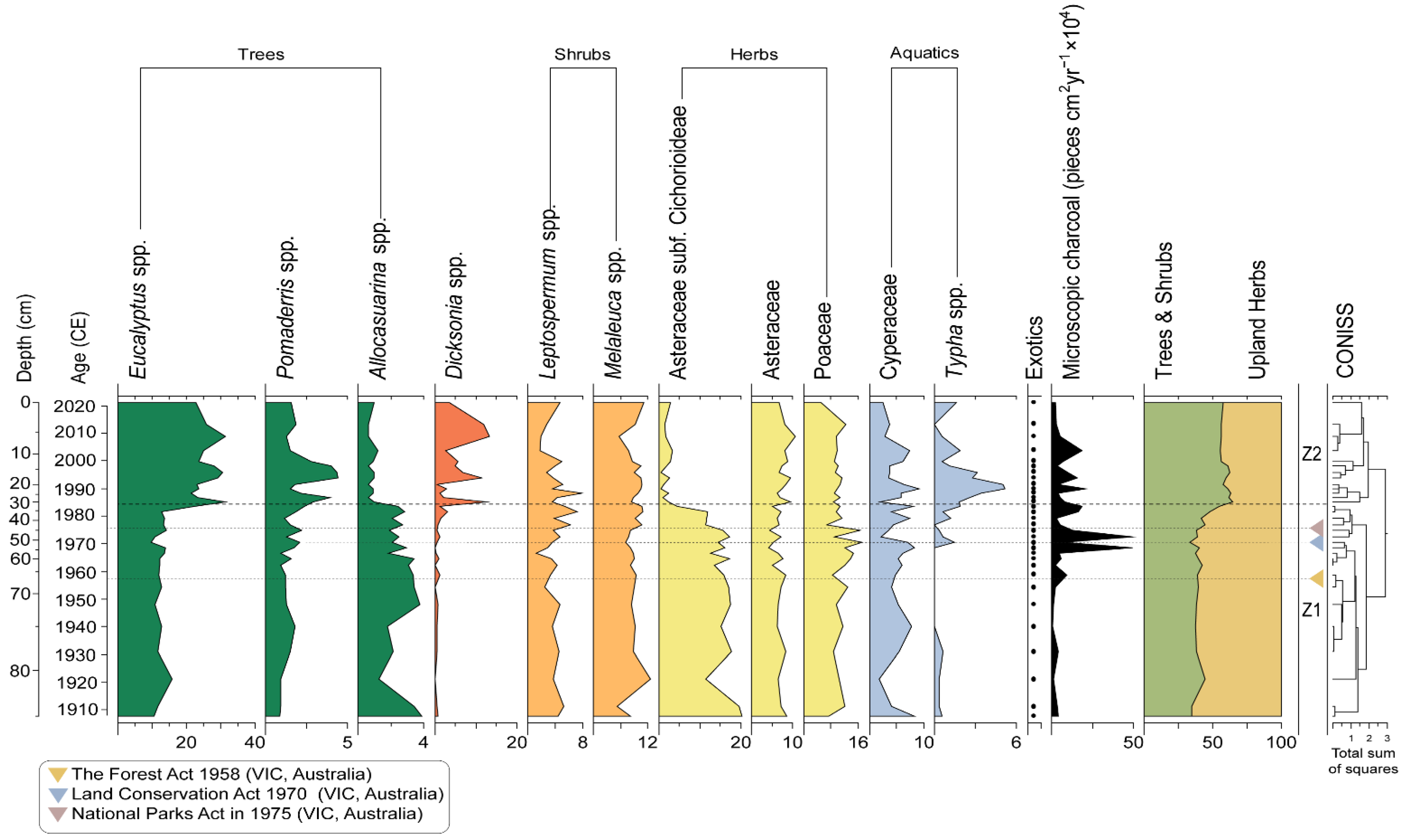
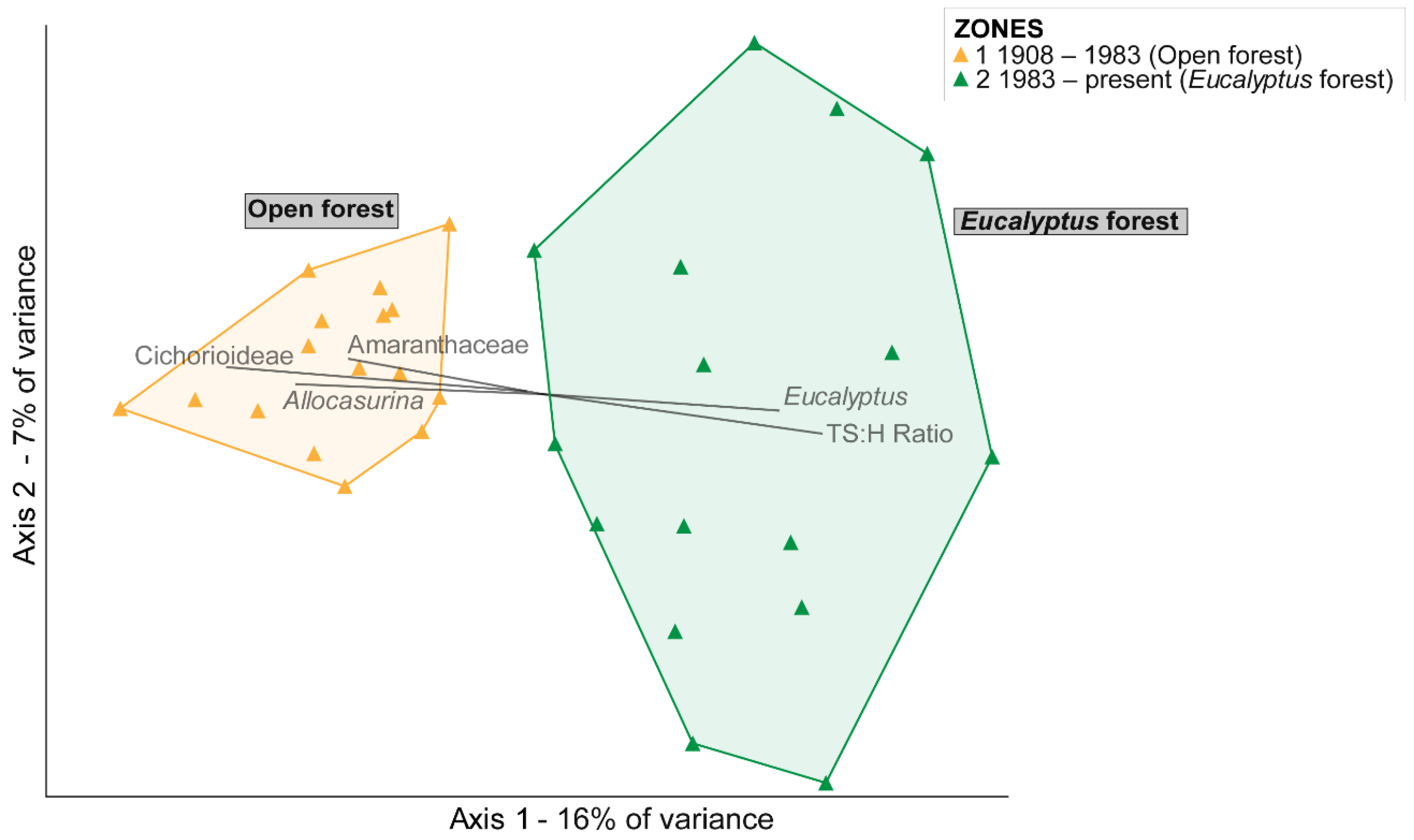

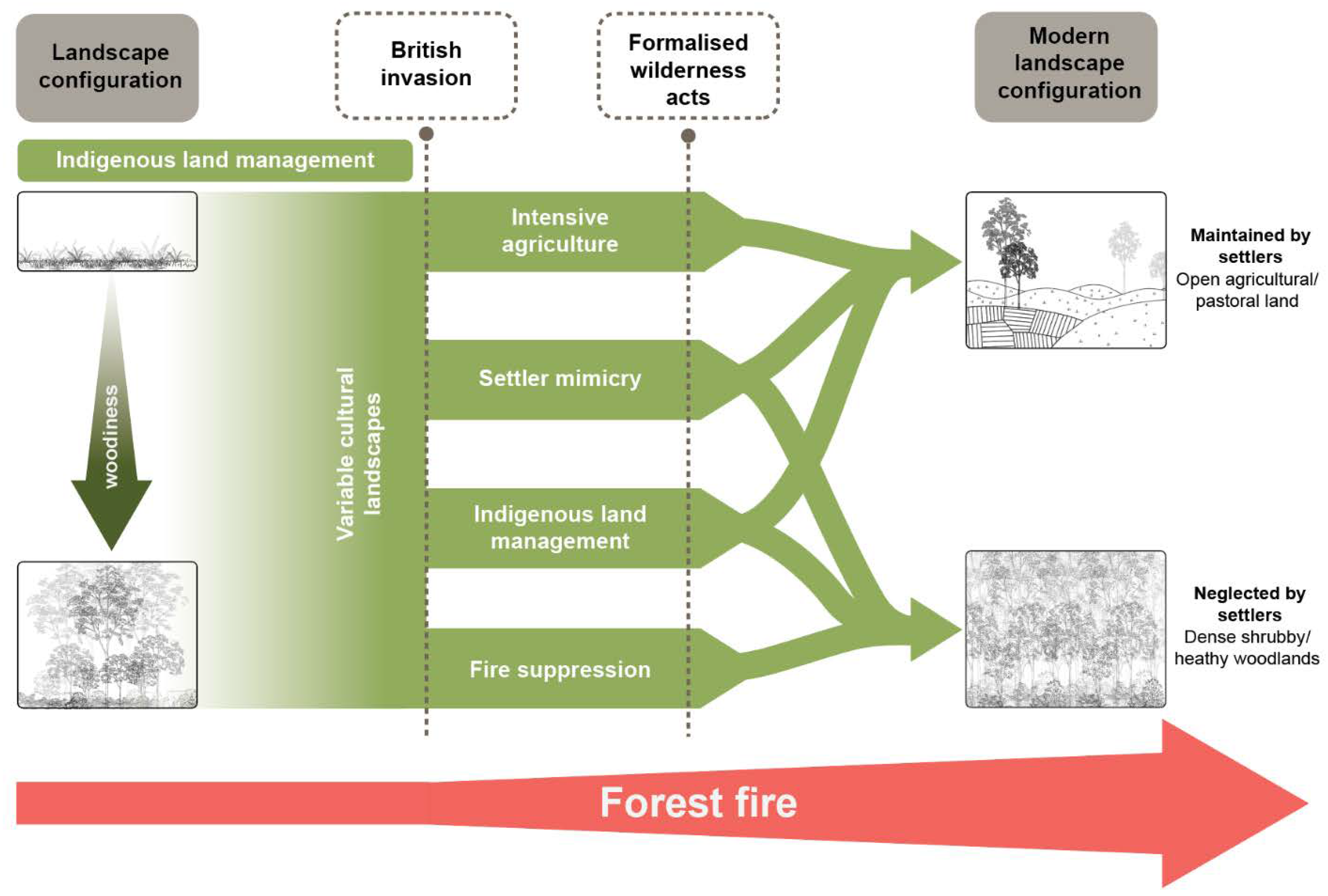
| Depth (cm) | Cumulative Dry Mass (g/cm2) | Total 210Pb (Bq/kg) | Unsupported 210Pb Decay (Bq/kg) | Calculated CRS Age (as Calendar Years CE) | CRS Error (Years) |
|---|---|---|---|---|---|
| 0 | 0 | 2021.09 | 0 | ||
| 0.25 | 0.04 | 157.86 | 4.56 | 2020.24 | 0.07 |
| 0.75 | 0.14 | 138.62 | 3.80 | 2018.24 | 0.17 |
| 2.25 | 0.25 | 126.20 | 4.62 | 2016.16 | 0.24 |
| 2.75 | 0.37 | 108.04 | 3.61 | 2014.01 | 0.31 |
| 3.25 | 0.51 | 100.99 | 4.82 | 2011.65 | 0.39 |
| 5.75 | 0.66 | 81.58 | 3.89 | 2009.31 | 0.46 |
| 7.25 | 0.84 | 85.51 | 9.94 | 2006.44 | 0.58 |
| 10.25 | 1.07 | 98.07 | 5.21 | 2001.74 | 0.74 |
| 15.25 | 1.27 | 110.20 | 5.53 | 1996.58 | 0.90 |
| 20.25 | 1.44 | 107.80 | 8.72 | 1991.10 | 1.07 |
| 30.75 | 1.65 | 67.99 | 5.78 | 1984.68 | 1.31 |
| 40.75 | 1.93 | 45.18 | 3.92 | 1977.73 | 1.61 |
| 55.75 | 2.28 | 59.00 | 6.00 | 1967.10 | 1.88 |
| 70.75 | 2.65 | 43.28 | 4.41 | 1950.75 | 2.56 |
| 81.75 | 3.01 | 55.52 | 4.48 | 1918.21 | 3.39 |
| 85.75 | 3.41 | 30.44 | 1.90 |
Publisher’s Note: MDPI stays neutral with regard to jurisdictional claims in published maps and institutional affiliations. |
© 2022 by the authors. Licensee MDPI, Basel, Switzerland. This article is an open access article distributed under the terms and conditions of the Creative Commons Attribution (CC BY) license (https://creativecommons.org/licenses/by/4.0/).
Share and Cite
Laming, A.; Fletcher, M.-S.; Romano, A.; Mullett, R., on behalf of Gunaikurnai Land and Waters Corporation; Connor, S.; Mariani, M.; Maezumi, S.Y.; Gadd, P.S. The Curse of Conservation: Empirical Evidence Demonstrating That Changes in Land-Use Legislation Drove Catastrophic Bushfires in Southeast Australia. Fire 2022, 5, 175. https://doi.org/10.3390/fire5060175
Laming A, Fletcher M-S, Romano A, Mullett R on behalf of Gunaikurnai Land and Waters Corporation, Connor S, Mariani M, Maezumi SY, Gadd PS. The Curse of Conservation: Empirical Evidence Demonstrating That Changes in Land-Use Legislation Drove Catastrophic Bushfires in Southeast Australia. Fire. 2022; 5(6):175. https://doi.org/10.3390/fire5060175
Chicago/Turabian StyleLaming, Alice, Michael-Shawn Fletcher, Anthony Romano, Russell Mullett on behalf of Gunaikurnai Land and Waters Corporation, Simon Connor, Michela Mariani, S. Yoshi Maezumi, and Patricia S. Gadd. 2022. "The Curse of Conservation: Empirical Evidence Demonstrating That Changes in Land-Use Legislation Drove Catastrophic Bushfires in Southeast Australia" Fire 5, no. 6: 175. https://doi.org/10.3390/fire5060175
APA StyleLaming, A., Fletcher, M.-S., Romano, A., Mullett, R., on behalf of Gunaikurnai Land and Waters Corporation, Connor, S., Mariani, M., Maezumi, S. Y., & Gadd, P. S. (2022). The Curse of Conservation: Empirical Evidence Demonstrating That Changes in Land-Use Legislation Drove Catastrophic Bushfires in Southeast Australia. Fire, 5(6), 175. https://doi.org/10.3390/fire5060175







